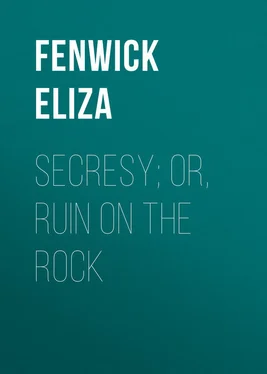Eliza Fenwick - Secresy; or, Ruin on the Rock
Здесь есть возможность читать онлайн «Eliza Fenwick - Secresy; or, Ruin on the Rock» — ознакомительный отрывок электронной книги совершенно бесплатно, а после прочтения отрывка купить полную версию. В некоторых случаях можно слушать аудио, скачать через торрент в формате fb2 и присутствует краткое содержание. Жанр: foreign_antique, foreign_prose, foreign_sf, на английском языке. Описание произведения, (предисловие) а так же отзывы посетителей доступны на портале библиотеки ЛибКат.
- Название:Secresy; or, Ruin on the Rock
- Автор:
- Жанр:
- Год:неизвестен
- ISBN:нет данных
- Рейтинг книги:3 / 5. Голосов: 1
-
Избранное:Добавить в избранное
- Отзывы:
-
Ваша оценка:
- 60
- 1
- 2
- 3
- 4
- 5
Secresy; or, Ruin on the Rock: краткое содержание, описание и аннотация
Предлагаем к чтению аннотацию, описание, краткое содержание или предисловие (зависит от того, что написал сам автор книги «Secresy; or, Ruin on the Rock»). Если вы не нашли необходимую информацию о книге — напишите в комментариях, мы постараемся отыскать её.
Secresy; or, Ruin on the Rock — читать онлайн ознакомительный отрывок
Ниже представлен текст книги, разбитый по страницам. Система сохранения места последней прочитанной страницы, позволяет с удобством читать онлайн бесплатно книгу «Secresy; or, Ruin on the Rock», без необходимости каждый раз заново искать на чём Вы остановились. Поставьте закладку, и сможете в любой момент перейти на страницу, на которой закончили чтение.
Интервал:
Закладка:
I walked about; and other thoughts entirely effaced an impression of something unusual in the noise; till, again, and in a louder degree, it assailed me. I hastened toward the door, but the voice I had heard in the wood called me to stay. I turned round, and the same figure was before me.
Andrew interrupts me. My uncle is returned home; has something to communicate; and expects me now. I go.
In continuation.
Farewel, thou precious resemblance I must part with thee. From yesterday, until the present hour, thou hast been mine. Farewel, then, exquisite shadow!
Caroline, I left my letter unfinished, yesterday; and hastened to the library.
'Come hither, child,' my uncle said as I entered; 'and tell me if this be a likeness.'
He presented to me a small case, and I beheld the picture of Clement. I folded both hands over it on my bosom. I had not words to thank Mr. Valmont; but the tears that rolled upon my cheeks were tears of gratitude.
'I ordered Clement,' my uncle continued, 'to send me his portrait, done by an eminent artist; and his obedience has been as prompt as I could desire. You may retire, Sibella, and take the picture with you; but you are to bring it back to the library to-morrow after my dinner hour.'
Only, conceive, Caroline, how I flew back to my apartment. Think how many fond avowals, how many rapturous caresses, I bestowed on the insensible image. While I eat, it lay before me; and while I slept, the little that I did sleep, it rested on my pillow.
I have counted the stroke of five, from the great clock. Now Mr. Valmont dines; and the picture is no longer mine. I have placed it in its case, ready for the hand of Mr. Valmont. I become dispirited. Farewel, precious shadow!
Farewel, also, Caroline to you!
SIBELLA VALMONTI have torn the seal away from this letter! I am breathless with the tidings! Clement, my Clement, is to return! Oh, Caroline, Caroline, did you ever weep for joy?
LETTER X
FROM CAROLINE ASHBURN TO SIBELLA VALMONT
Certainly, a picture is at all times a very pretty toy; and I can readily imagine, that the picture of an absent lover must be indeed a precious blessing; but you will forgive me, Sibella, if I honestly confess that I have a hundred times, since the receipt of your letter, wished Clement had not been so willing, or his artist not so ready.
Oh, that Mr. Valmont had withheld the picture but one hour longer! Then would the womanish curiosity of Caroline Ashburn have been gratified. For, trust me, Sibella, your surprise at finding your enigmatical hermit in the Armoury could not exceed my disappointment at leaving him and you there without further explanation.
I have imagined and imagined; returned to the subject; and quitted it again, more wearied than before; and, though I did, after a time, discover that I never should, by the mere aid of suppositions, find of what materials your hermit is composed, yet I have persisted in comparing accidents, and combining circumstances perhaps totally remote from each other, with the vain hope of tracing him. Knowing how much your uncle worships mystery, I sometimes think it may be one of his stratagems; – sometimes that – Psha! The folly of conjecture grows with me.
Pardon me, Sibella, you are above these things. Uniform in rectitude, you steadily pursue the path before you; nor mislead yourself to follow the swervings of others. In compassion, however, to the longings of your friend, hasten to communicate the remainder of this your adventure.
Our poor Indian is dead. She survived her reception at Barlowe Hall only about ten days; and, during the visits I made her, I never found her capable of sustaining any conversation with me. From her, as she was long a resident in the family, I hoped and expected to have been informed by what means my father amassed his fortune: for, the suspicions which I find generally attached to East Indian riches sit heavy on my mind. I do not love to encourage suspicion, for it is cowardly; nor can I indeed fairly give my opinions the name of suspicions, for I am persuaded, that in whatever clime or country it be found, the mind that grasps at such inordinate wealth must be vicious, and that there can be but little to choose among the degrees of vice wherewith it is obtained. Yet, being convinced as to that point, I still wish to know the employments of my father's life: for it is possible there may be some retribution to make to individuals. A voyage to India for such a purpose, Sibella, would be but as a pleasant summer day's excursion.
Your letter has been sent after me to Bath, for Barlowe Hall no longer retains her circle of gay visitors. The Ulson family have gone I forget where, and taken the Winderhams with them, while we, together with Sir Thomas, Lady Barlowe, and Colonel Ridson, arrived at Bath last week. The season is crowded, and my mother and the nabob think themselves fortunate in having been able to secure one large and commodious house for the reception of both families.
This arrangement Lady Barlowe and Mrs. Ashburn profess to find very pleasing. They declare a violent friendship for each other; and use it as a cloak for the workings of their secret malignities. My mother is the object of Lady Barlowe's envy: for the nabob's fears have made him covetous; he hoards his diamonds in their cases; and Lady Barlowe's glitter is out-glared by the happier uncontrouled Mrs. Ashburn.
On the other hand, Lady Barlowe has youth, and has beauty; and these attractions Mrs. Ashburn finds the lustre of the diamond will not altogether outshine, though there are many among the venal crowd, who daily offer up at the shrine of wealth the incense due to merit, wit, and beauty.
Sir Thomas, I believe, considers himself as bound to play both his own part and his nephew's; and to overwhelm us with the attentions and kindnesses, his ungracious Arthur withheld.
Did I not tell you, or rather did I not intimate, that before Mr. Murden made his appearance amongst us, the Baronet evidently bestowed him upon me? but, alas, scarcely had he arrived, when his uncle, remembering the value of a certain old proverb, left me to seek another lover; and gave or would have given his all-prized nephew to my mother.
It was highly whimsical to see the Baronet's labours to promote this end. He dared not be quite certain, that Murden, although dependent on him, would yield him an implicit obedience; and yet, according to his understanding, the scheme had so many and such important recommendations, that they were not to be hastily rejected. Fearing to be out-talked, if not convinced, should he at once resort to his nephew's opinion, the Baronet would not venture to do so; but, secure in the presence of numbers, he grew bold at hint, and soon made his plan fully comprehended by every person present; and put his nephew's ingenuity to the trial to find methods how to express his disapprobation, without being rude and offensive to the feelings of any one. I cannot say that Mrs. Ashburn appeared to think Sir Thomas very absurd in his designs.
After playing this game of hint, till the party talked of separating, the Baronet then acquired courage enough to make a direct attack on his nephew; the latter gave an explicit refusal to the proposal; and the former for some days lost his good humour and his patience.
It was, I suppose, in consequence of this marked displeasure from his uncle, that Murden thought of paying a visit to a friend at some distance from Barlowe Hall. At first, Sir Thomas opposed it not; but when Murden was actually on the point of going, the nabob relaxed his solemn displeasure, and earnestly requested Arthur not to leave him. Arthur, in his turn, became inflexible, and would not be intreated. He had written, he said to his friend, and go he must. At length, however, he condescendingly offered to hasten to join us at Bath; and, having thus accommodated their difference, the nabob and his nephew parted very good friends.
Читать дальшеИнтервал:
Закладка:
Похожие книги на «Secresy; or, Ruin on the Rock»
Представляем Вашему вниманию похожие книги на «Secresy; or, Ruin on the Rock» списком для выбора. Мы отобрали схожую по названию и смыслу литературу в надежде предоставить читателям больше вариантов отыскать новые, интересные, ещё непрочитанные произведения.
Обсуждение, отзывы о книге «Secresy; or, Ruin on the Rock» и просто собственные мнения читателей. Оставьте ваши комментарии, напишите, что Вы думаете о произведении, его смысле или главных героях. Укажите что конкретно понравилось, а что нет, и почему Вы так считаете.












